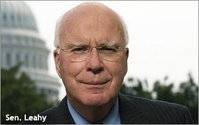
Comcast should vow to refrain from charging content companies higher fees in exchange for speedier delivery of their material, the head of the Senate Judiciary Committee said on Monday.
Those types of fast-lane arrangements “pose a significant threat of dividing the Internet into those who can afford to compete and those who cannot,” Sen. Patrick Leahy (D-Vt.) wrote in
a letter to Comcast executive vice president David Cohen.
“Small business owners that rely on the Internet reach customers, independent content producers who rely on new platforms to
gain an audience, and start-up ventures of all sizes have loudly and validly expressed concern that paid prioritization would change the Internet as we know it,” Leahy added.
The
lawmaker is asking Comcast to promise to avoid paid prioritization arrangements -- regardless of whether its pending $45 billion merger with Time Warner Cable is approved.
Comcast currently is
obligated to follow the FCC's old Net neutrality rules -- which appear to prohibit paid prioritization -- through at least 2018, as a condition of its merger with NBC. After that date, however,
Comcast will no longer be bound to follow the former neutrality rules.
Those old regulations, which the FCC passed in 2010, were invalidated in January by an appellate court. The FCC currently
is considering how to reshape the rules in a way that will meet with court approval.
Earlier this year, FCC Chairman Tom Wheeler proposed a set of regulations that would prohibit broadband
providers from blocking or degrading content, but would allow them to enter into “commercially reasonable” paid prioritization agreements. But that proposal proved controversial with Net
neutrality advocates, who say that paid fast lanes are incompatible with open Internet principles.
Wheeler's proposal has garnered a record-breaking 3.7 million comments, many of which are
critical of fast lanes. Earlier this month, President Barack Obama publicly voiced opposition to the plan. "I know that one of the things people are most concerned about is paid prioritization, the
notion that somehow some folks can pay a little more money and get better service, more exclusive access to customers through the Internet. That is something I’m opposed to,” he said at a
town hall meeting in Santa Monica, Calif.
In June, Leahy and Rep. Doris Matsui (D-Calif.), introduced a bill that would direct the FCC to prohibit broadband providers from charging content
companies extra fees for fast delivery.
A Comcast spokesperson says the company is reviewing Leahy's letter.
The company has said on prior occasions that it doesn't currently
offer paid fast lanes, and has no plans to do so.